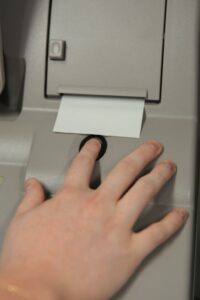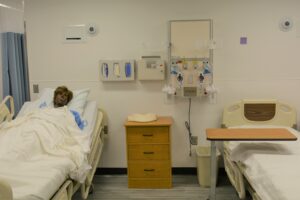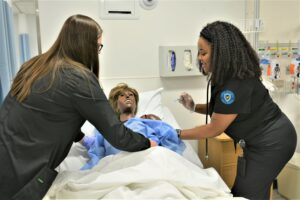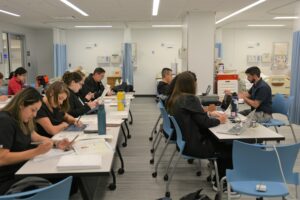UAMS Welcomes First Class in Accelerated BSN Program, Opens Simulation Center in Northwest Arkansas
| FAYETTEVILLE — A new class of nursing students are experiencing real-world scenarios in a new simulation center on the Fayetteville campus of the University of Arkansas for Medical Sciences (UAMS). All UAMS students in Northwest Arkansas will eventually use the center.
UAMS’s new accelerated Bachelor of Science in Nursing (BSN) is a 15-month program designed to quickly transition those outside the profession into nursing. It is open to applicants with a bachelor’s or higher degree in any field and requires prerequisite grounding in health sciences such as anatomy, physiology, chemistry and microbiology. The first class of 24 students started the program in June 2022 and will graduate in August 2023.
“There is a critical need to educate additional registered nurses (RNs) to address current and future nursing workforce shortages,” said Patricia Cowan, Ph.D., RN, dean and professor of the UAMS College of Nursing. “Challenges in recruiting and retaining nurses in all areas of hospital care have intensified since the onset of the COVID-19 pandemic. Even after resolution of the pandemic, the shortage of RNs regionally and in Arkansas will intensify in the coming years. The accelerated BSN program is projected to provide hundreds of nurses over a 10-year period.”
The UAMS College of Nursing will continue to offer its traditional BSN program on the Little Rock campus.
The 3,400-square-foot simulation center will provide a state-of-the-art training space for students in all of the UAMS education programs in Northwest Arkansas, according to Jay Gandy, Ph.D., associate provost of the UAMS Northwest Regional Campus.
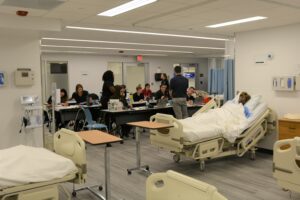
Students in all of the UAMS education programs in Northwest Arkansas receive classroom instructions and hands-on training in the 3,400-square-foot simulation center.
“The simulation center will be used to train the best and brightest future health care professionals right here in Northwest Arkansas — who will then provide the highest quality of care for the patients they will serve,” Gandy said. “Beginners can gain confidence in new skills, and seasoned health care professionals can master the continuously growing array of new technologies.”
The simulation center supplements classroom learning and clinical settings with the use of standardized patients, patient simulator manikins and other high-fidelity simulation that offers interactive, challenging learning experiences in a safe, nonthreatening environment for students.
“An important component of quality nursing education is simulation training,” Cowan said. “Simulation training gives students hands-on experience in a clinical setting in a controlled environment. Having up-to-date technology, physical space and equipment is essential to creating this real-world experience.”
Features include:
- 12 “patient” beds
- Multiple high-fidelity manikins to simulate medical emergencies in a full range of ages
- Low-fidelity task trainers for high-frequency skills training, such as intubating and birthing
- Medication preparation room with fingerprint-activated Pyxis medication access system
- Interactive video connections to ensure maximal education across academic settings and to rural sites
- Control rooms separated by one-way glass
- Debriefing conference rooms
- Digital health units
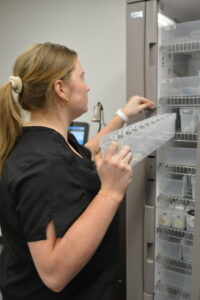
A UAMS nursing student retrieves “medication” in the medication preparation room through a fingerprint-activated Pyxis medication access system.
“By using advanced technology to imitate real-life medical situations, simulation education acts as a bridge between classroom learning and clinical experience,” said Lauren Haggard-Duff, PhD, RN, clinical associate professor and director of the accelerated BSN program. “Students can receive advanced training in a setting that allows them to receive real-time feedback from their instructors and standardized patients.”
UAMS already has expertise in developing simulation centers on its Little Rock campus, including the Centers for Simulation Education and the College of Nursing Interprofessional Practice and Simulation Center. Bringing a simulation center to Northwest Arkansas was the next logical step, Cowan said.
UAMS is the state’s only health sciences university, with colleges of Medicine, Nursing, Pharmacy, Health Professions and Public Health; a graduate school; a hospital; a main campus in Little Rock; a Northwest Arkansas regional campus in Fayetteville; a statewide network of regional campuses; and seven institutes: the Winthrop P. Rockefeller Cancer Institute, Jackson T. Stephens Spine & Neurosciences Institute, Harvey & Bernice Jones Eye Institute, Psychiatric Research Institute, Donald W. Reynolds Institute on Aging, Translational Research Institute and Institute for Digital Health & Innovation. UAMS includes UAMS Health, a statewide health system that encompasses all of UAMS’ clinical enterprise. UAMS is the only adult Level 1 trauma center in the state. UAMS has 3,047 students, 873 medical residents and fellows, and six dental residents. It is the state’s largest public employer with more than 11,000 employees, including 1,200 physicians who provide care to patients at UAMS, its regional campuses, Arkansas Children’s, the VA Medical Center and Baptist Health. Visit www.uams.edu or www.uamshealth.com. Find us on Facebook, Twitter, YouTube or Instagram.
The UAMS Northwest Regional Campus includes 288 medical, pharmacy, nursing and health professions students, 64 medical and pharmacy residents, two sports medicine fellows, and 1,000 community-based faculty. The campus has nine clinics including a student-led clinic and physical, occupational and speech therapy. Faculty conduct research to reduce health disparities. Visit www.uams.edu or www.uamshealth.com. Find us on Facebook, Twitter, YouTube or Instagram.

